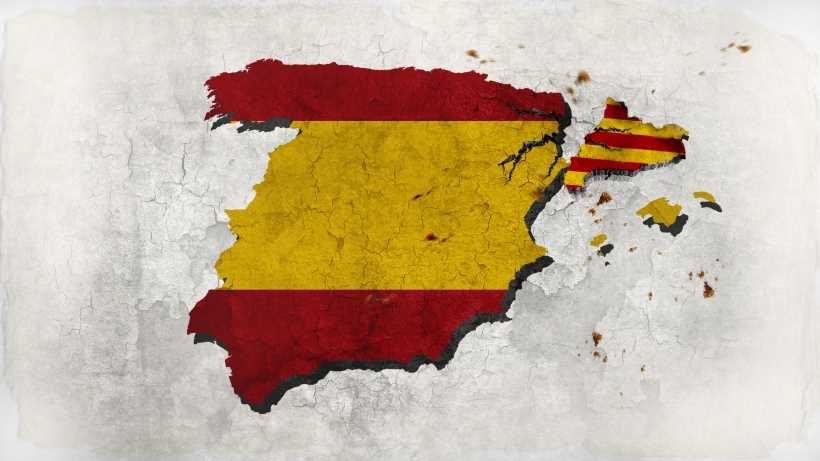
Source: This image was created for netivist.org based on una cierta mirada’s image. If you want to use it you simply need to attribute it by linking to this page or to https://netivist.org. Thanks
The pro-independence movement in Catalonia is a first order concern in Spain and Europe. Catalonia as an independent state: is it really such a good idea? Vote and leave your arguments below.
Referendum of independence
Catalan independence campaign is gathering a noticeable amount of support within Catalonia and abroad. On 1 October 2017 the pro-independence nationalist movement organized an illegal referendum of independence. Only 3 years before, on 9 November 2014 the Generalitat (Government of Catalonia) organized another public consultation about the independence of Catalonia. Although this was not a legal referendum, banned by the Spanish Constitutional Court, the relatively high level of participation demonstrated that the pro-secession camp was very strong in Catalonia. The question whether Catalonia should become an independent state have dominated regional politics in Catalonia ever since and the tensions between the two camps have mounted.
Catalonia and independent state?
Catalan nationalist parties have claimed that there is excessive interdependence within Spain and that a much larger share of the taxes collected in Catalonia should stay in Catalonia. They have accused the government of not recognizing sufficiently their different identity and declared that it is too late to reach and agreement, so that the only way out of the current institutional crisis is to seize independence. Catalan independence parties have adopted populist communication strategy. On the other hand, pro status quo parties claim that Catalan nationalists are overemphasizing the differences between Catalans and the rest of the Spaniards and disregarding the negative consequences that the independence could have for all Spanish people (including many Catalans). They also argue that pro-independence arguments collide with the principles of solidarity, equality and the Spanish legal framework. For them the solution to this crisis is to be found through institutional dialogue rather than with secession.
The 27 September 2015 regional elections have been a new test to measure the strength of the partisans of independence and those who want Catalonia to remain in Spain. The pro-independence parties (which have ruled Catalonia over the last few years) want to use the results of the elections as a mandate to unilaterally declare independence. This would mean a break away contrary to Spanish law, and probable exclusion from the EU and most international organizations and treaties. The stakes are high. Would a political solution suffice?
What do you think about the Catalan case? Is Catalonia's pro-independence struggle equivalent to that of anti-colonial liberation movements? Do you think secession is the best way to solve the problems of Catalonia? Would the independence of Catalonia be positive for Catalans and the rest of the Spaniards? In case of an independence referendum, shouldn't the rest of Spaniards be consulted too? Should 16-year-olds be allowed to vote in such referendum?
If you change your mind, you can change your vote simply by clicking on another option.
New to netivist?
Join with confidence, netivist is completely advertisement free. You will not receive any promotional materials from third parties.
Join the debate
In order to join the debate you must be logged in.
Already have an account on netivist? Just login. New to netivist? Create your account for free.
You are viewing a filtered list of comments. Click the button above to view all comments.
Spain today is mostly based on the expansion of the Kingdom of Castile, either through marriage or through war. However, it is only with the defeat of the Catalan troops in 1714 that the unification and homogenization of the Spain that Catalonia looses its special status from mediaeval times. As for the taxes, the Basque country basically keep all the taxes they collect and only then they an agreed quota to the state. This is what most people in Catalonia want. It is also important to keep in mind that different regions have different costs of living and an equal share of taxes does not really equate to an fair distribution because of the cost of living. At an European scale, it would be like setting an average minimum wage across Europe. It would be impossible to people in Denmark of Finland to survive, while Romanians would be living extremely well. I do hope that a solution for Catalonia is found because I think everyone is better off together. However, pointing at the constitution and saying that something is not possible is not really the solution. A constitution is supposed to set the limits of the state's rules and define fundamental rights, including those that may be in a minority. When a big minority does not accept the righteousness of their own constitution, there is something wrong with it. Everyone is a minority, in one way or the other.
I do think more can be done to unite people in Spain, but currently there is a radicalization of positions. I do not understand why Catalan and the other official Spain languages are not an optional language in school across Spain. In the same way, all the main regional TV channels should be broadcasted across Spain.
What you say about Catalonia being more diverse than other regions within Spain is very debatable. There has been a very persuasive discourse about differentiating Catalonia from the other regions and homogenising the rest of Spain as if it was only one entity. Catalonia does not have a separate history from Spain. From that perspective, Andalusia, formerly Al-andalus, would have more claims to be independent than Catalonia. The fact is that Spain is a multicultural country and that multiculturalism is respected in the current institutional framework within the limits of the Constitution of course. Spain is a democratic State and things can be changed, but following the rule of law. As for Catalonia's solidarity with the rest of Spain, please let me remind you that regions do not pay taxes. It's the individuals living in Catalonia that tend to be higher earners in the rest of Spain, and as such they pay more taxes. The same happens to people in Madrid or Balearic Islands. Any person who has a high income could claim that they don't want solidarity to be forced on them and they want to limit them, but that's how redistribution works. The government in Catalonia administer its own budget. Maybe it's time they spend the money on sensible things rather than embassies abroad and nationalist propaganda. It would be much more constructive to focus on what unite people in Spain and elsewhere rather than always thinking in what separate us.
Join the debate
In order to join the debate you must be logged in.
Already have an account on netivist? Just login. New to netivist? Create your account for free.


















